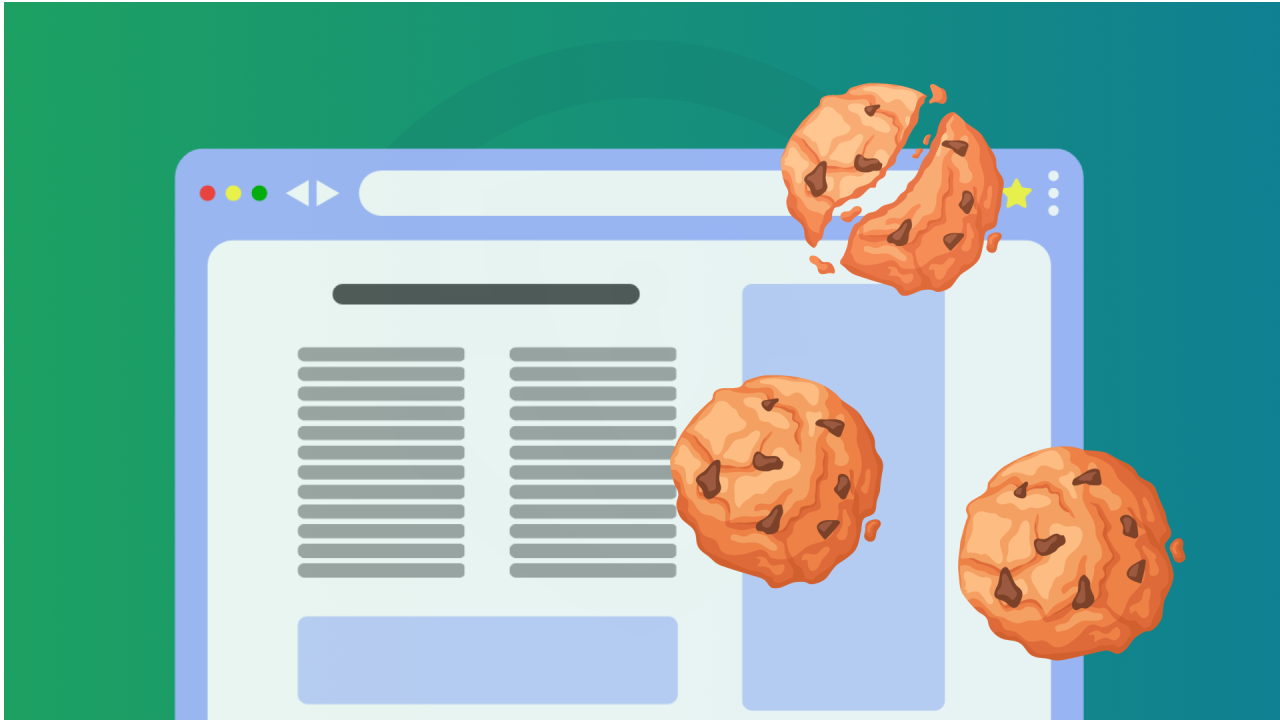Website cookies are essential tools that enhance user experience, provide valuable insights for marketers, and ensure smooth website functionality. This comprehensive guide delves into the nature of cookies, their importance, privacy concerns, and the evolving landscape of marketing with and without cookies. By understanding cookies’ roles and challenges, businesses can implement best practices for responsible use and optimize their benefits. Stay informed with the latest updates and future trends in the world of cookies and digital marketing.
Table of Contents
What are Website Cookies?
Website cookies are small pieces of data stored on a user’s device by the web browser while they are browsing a website. These tiny data packets are created by the server and sent to the browser, where they are stored and can be accessed later.
Cookies serve various functions, such as keeping track of a user’s session, remembering preferences, and facilitating smoother user experiences. They act like a memory for the website, allowing it to recognize and respond to users appropriately during their visits and on subsequent returns.
Types of Cookies
To understand the versatility of cookies, it is essential to look at the different types available.
Session Cookies
Session cookies are temporary and are deleted from the user’s device once the browser is closed. They are used to store information about the user’s current session, such as login credentials or items in a shopping cart, ensuring that these details are not lost as the user navigates through different pages of a website. For example, when you log into your email account, session cookies ensure you stay logged in as you move from your inbox to other sections.
Persistent Cookies
Unlike session cookies, persistent cookies remain on the user’s device for a specified period, even after the browser is closed. These cookies are used to remember user preferences and settings for future visits. For instance, a website might use persistent cookies to keep track of your language preference or to remember your login details so you don’t have to re-enter them each time you visit.
First-Party Cookies
First-party cookies are set directly by the website the user is visiting. They are often used to store user preferences, login details, and other information that enhances the user experience on that particular site. For example, if you customize the layout of a news website, the settings will be saved using first-party cookies.
Third-Party Cookies
Third-party cookies are set by a domain other than the one the user is currently visiting. These cookies are commonly used for tracking and advertising purposes.

Tracking user behavior across multiple websites for targeted advertising.
They enable advertisers to deliver targeted ads across different websites by tracking a user’s browsing habits. For instance, you might notice ads related to recent searches or websites you’ve visited, thanks to third-party cookies.
Secure Cookies
Secure cookies are a special type of cookie that can only be transmitted over encrypted connections (HTTPS). They are used to ensure the security of the data being transferred, such as login information or payment details. Websites use secure cookies to protect sensitive information from being intercepted by malicious parties.
How Cookies Work
When a user visits a website, the server generates a cookie and sends it to the user’s web browser. This cookie is a small text file that contains data such as a unique identifier, and optionally, other information like session details or user preferences. The browser stores this cookie on the user’s device in a designated location.
Each time the user makes a request to the website, the browser automatically includes the relevant cookies with the request. This process allows the server to recognize the user and retrieve stored information to tailor the response accordingly. For instance, if a user adds items to an online shopping cart and navigates to another page, cookies ensure that the items remain in the cart.
Cookies are stored in the browser’s cookie directory, and each cookie is associated with a specific domain and path. Browsers enforce security measures to prevent cookies from being accessed by unauthorized domains, ensuring that only the intended website can read its cookies.
Common Use Cases
One of the most common uses of cookies is session management. When you log into your favorite social media platform, session cookies keep you logged in as you navigate through different pages of the site. Without these cookies, you would have to re-enter your login information every time you moved to a new page.
Cookies are also extensively used for personalization. E-commerce websites, for example, use persistent cookies to remember your language preference, display your saved shopping cart items, and suggest products based on your browsing history. This personalized experience enhances user satisfaction and can drive sales.
Another significant use of cookies is in tracking and analytics. Websites employ cookies to gather data on user behavior, such as which pages are visited most frequently, how long users stay on a page, and what links they click. This information helps website owners optimize their sites and improve the overall user experience.
The Importance of Website Cookies
These cookies might not seem that useful to the average web user, but they have more benefits than people realize. Here are some of these:
User Experience
Website cookies play a crucial role in enhancing user experience. They personalize and customize the content and services provided. When a user visits a website, cookies can store information about their preferences and behavior.

Enhancing personalization and website functionality.
For instance, a news website might use cookies to remember the types of articles a user frequently reads. Subsequently it can recommend similar content. This level of personalization makes the user’s experience more engaging and relevant, fostering a deeper connection with the website. Personalized greetings, tailored advertisements, and customized content are all made possible through the use of cookies.
User Preferences
One of the most appreciated conveniences provided by cookies is the ability to remember user preferences and login details. This function is especially useful for users who frequently revisit certain websites.
For example, an online retail site can save your shipping address and payment information, making the checkout process quicker and more seamless. Similarly, websites that require login credentials can use cookies to keep users logged in. This way, they don’t have to enter their username and password each time they visit. This not only saves time but also enhances the overall user experience by making interactions with the website more efficient.
Website Functionality
Cookies are essential for ensuring the smooth functionality of many websites. They help maintain the state of various components of a website, which is crucial for multi-step processes. For example, in e-commerce sites, cookies keep track of the items in a user’s shopping cart as they browse through different pages.
Without cookies, users would have to add items to their cart every time they navigated to a new page, leading to a frustrating and disjointed experience. Cookies also help in managing user sessions, ensuring that actions such as filling out forms or completing transactions are carried out seamlessly without interruption.
Website Speed
Cookies contribute to the enhancement of website performance and speed by storing data locally on the user’s device. This reduces the need for repetitive server requests, which can slow down website loading times.
For instance, cookies can store static content such as images, stylesheets, and scripts, allowing the website to load faster on subsequent visits. This caching mechanism improves the overall speed and responsiveness of the site, leading to a more satisfying user experience. Faster loading times not only keep users engaged but also positively impact a website’s search engine ranking, making it more accessible to a broader audience.
Tracking and Analytics
Cookies are indispensable tools for gathering data on user behavior, which is vital for website optimization. By tracking how users interact with a site, cookies provide insights into which pages are most popular, how long visitors stay on each page, and which features are most frequently used.
This data helps website owners understand user preferences and pain points, allowing them to make informed decisions about site improvements. For example, if analytics show that users frequently abandon their shopping carts on a particular page, website owners can investigate and address potential issues to enhance the user experience.
Marketing with Cookies
Website cookies are essential for digital marketing campaigns and are used in a number of strategies.
Targeted Advertising
Cookies play a pivotal role in targeted advertising, a marketing strategy that focuses on delivering ads tailored to an individual’s interests and behavior. When a user visits a website, cookies can track their browsing history, searches, and interactions. This data is then analyzed to create a detailed profile of the user’s preferences and interests.

Tracking user behavior to deliver personalized ads across websites.
Advertisers use these profiles to serve ads that are relevant to the user’s recent activities. For example, if you browse for hiking boots on an online store, you might start seeing ads for outdoor gear on other websites. This targeted approach ensures that advertisements are more likely to capture the user’s attention and result in conversions.
Retargeting Campaigns
Retargeting is a marketing technique that focuses on re-engaging users who have visited a website but did not complete a desired action, such as making a purchase. Cookies facilitate retargeting by tracking users’ interactions with the website and storing this data.
When a user leaves the site without converting, cookies can trigger retargeted ads on other websites they visit, reminding them of the products or services they showed interest in. For example, if you browse a particular item on an e-commerce site but do not buy it, you might see ads for that item or similar products on different websites later.
Analytics and Insights
Cookies provide a wealth of data that can be leveraged for marketing analytics. By tracking user interactions and behaviors, cookies collect valuable information about how users navigate a website, what content they engage with, and which products they view or purchase.
This data helps marketers understand the effectiveness of their campaigns and identify areas for improvement. For instance, your analytics show that a significant number of users drop off at a specific point in the purchase process. Now, you can investigate and address potential issues to enhance user experience and increase conversions.
Understanding Audience Behavior
Understanding audience behavior and preferences is critical for creating effective marketing strategies, and cookies are key to this understanding. By analyzing cookie data, marketers can gain insights into user demographics, interests, and purchasing patterns.
This information allows for the creation of highly targeted campaigns that resonate with specific audience segments. For example, if cookie data reveals that a particular group of users frequently visits the electronics section of a website, marketers can tailor their campaigns to highlight new electronics products or special deals in that category.
Cookies can also help track the performance of different marketing channels and content types, providing insights into what works best for engaging the audience. This enables marketers to allocate resources more effectively and optimize their strategies for maximum impact. With this, marketers can stay agile and responsive to changing user behaviors and preferences.
Marketing Without Cookies
As privacy concerns grow, regulations and browser policies are increasingly restricting the use of cookies, posing significant challenges for marketers. Browsers like Google Chrome, Safari, and Firefox are phasing out third-party cookies, which have long been a cornerstone of targeted advertising.
This shift means marketers can no longer rely on cookies to track user behavior across multiple sites, making it harder to deliver personalized ads and measure their effectiveness. The loss of this tracking capability also complicates retargeting efforts, making it more difficult to re-engage users who have shown interest in products or services but did not convert.
A Cookie-Less Future
The transition to a cookie-less future has a profound impact on digital marketing strategies. Without the detailed insights provided by third-party cookies, marketers face a data gap that can hinder their ability to understand and target their audience effectively. This shift necessitates a stronger focus on privacy, transparency, and user consent.

A digital future shaped without cookies and the impact on online privacy.
Marketers must find new ways to gather and utilize data while respecting user privacy and adhering to evolving regulations. The emphasis is now on developing alternative methods for tracking and targeting that do not rely on third-party cookies, ensuring that marketing efforts remain relevant and impactful.
Contextual Advertising
One promising alternative to cookie-based marketing is contextual advertising. This approach involves displaying ads based on the content of the web page rather than tracking user behavior. For example, an ad for sports equipment might appear on a webpage about fitness or a blog post about training tips.
Contextual advertising is effective because it aligns with the user’s current interests and context, making the ads relevant without needing to track their behavior across different sites. This method respects user privacy and can still achieve high engagement rates by targeting users based on the content they are consuming.
First-Party Data
First-party data, collected directly from interactions with a company’s own website, app, or other platforms, is becoming increasingly valuable. This data includes information provided by users through forms, purchase histories, and interaction logs. By focusing on first-party data, companies can build a comprehensive understanding of their customers’ preferences and behaviors.
Engaging users directly through surveys, loyalty programs, and personalized content also helps in gathering valuable insights. This approach fosters a stronger, more transparent relationship with users, as they are more likely to share their data willingly when they understand how it will be used to enhance their experience.
Tools and Technologies
Several tools and technologies are being developed to help marketers adapt to a cookie-less environment. Privacy-first analytics platforms, such as Google Analytics 4, are designed to operate without third-party cookies and provide insights based on first-party data. These platforms use advanced algorithms and machine learning to fill in data gaps and offer robust analytics while ensuring compliance with privacy regulations.
Customer data platforms (CDPs) are also gaining popularity. CDPs aggregate and manage first-party data from various sources, creating unified customer profiles that can be used for personalized marketing. These platforms help marketers gain a holistic view of their customers and deliver targeted experiences without relying on third-party cookies.
Digital Delights
Website cookies are indispensable tools for enhancing user experience, marketing, and website performance. However, their use comes with significant privacy concerns and regulatory challenges. By implementing cookies responsibly, optimizing their usage, and regularly updating policies, businesses can balance the benefits with user privacy.
As the digital landscape evolves towards a cookie-less future, embracing alternative strategies and technologies will be crucial for effective and ethical marketing, ensuring compliance and maintaining user trust.
Discover how EvolveDash can transform your digital marketing strategies with innovative solutions.
FAQs
What is the difference between first-party and third-party cookies?
First-party cookies are created by the website a user is directly visiting, while third-party cookies are created by a different domain, typically for tracking or advertising purposes.
Can cookies track my location?
Yes, cookies can track location information if location services are enabled in the browser. They help tailor content, such as showing location-based offers or content.
How can users delete cookies from their browser?
Users can clear cookies by accessing their browser settings. Most browsers have a “Clear browsing data” option that allows users to delete cookies.
Are cookies harmful to user privacy?
Cookies themselves are not harmful, but they can be misused for tracking users without consent. This has raised privacy concerns, especially with third-party cookies.
Do cookies slow down website performance?
Cookies can help speed up websites by storing data locally. However, excessive or poorly managed cookies may lead to slower load times if they generate unnecessary requests.



















